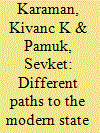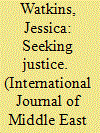|
|
|
Sort Order |
|
|
|
Items / Page
|
|
|
|
|
|
|
| Srl | Item |
| 1 |
ID:
127820


|
|
|
|
|
| Publication |
2013.
|
| Summary/Abstract |
Theoretical work on taxation and state-building borrows heavily from early modern European experience. While a number of European states increased centralized tax revenues during this period, for others revenues stagnated or even declined and these variations have motivated alternative arguments for the determinants of fiscal and state capacity. This study reviews the arguments concerning the three determinants that have received most attention, namely warfare, economic structure, and political regime, and tests them by making use of a new and comprehensive tax revenue dataset. Our main finding is that these three determinants worked in interaction with each other. Specifically, when under pressure of war, it was representative regimes in more urbanized-commercial economies and authoritarian regimes in more rural-agrarian economies that tended to better aggregate domestic interests towards state-building.
|
|
|
|
|
|
|
|
|
|
|
|
|
|
|
|
| 2 |
ID:
114983


|
|
|
|
|
| Publication |
2011.
|
| Summary/Abstract |
Norman Angell's The Great Illusion, which ran through six versions in London between November 1909 and December 1938, has some claim to have launched International Relations as a self-consciously independent yet sub-consciously liberal discipline. Understood to argue primarily that the interlocking fragility of the international financial system stopped modern states profiting from aggression, its ideas were promoted by a specially created foundation as 'the science of international politics' or 'international polity'. Since the 1970s, moreover, the book has been credited by scholars with pioneering the concepts of interdependence and globalisation. Now, therefore, it is less its seminal qualities than its fundamental flaws that require emphasis. Its celebrated claim about the irenic implications of financial interdependence was widely misunderstood as implying the impossibility, in addition to the disutility, of aggression. And a little-noticed second argument - that political control over territory brought no substantive benefits - was not only implausible but inconsistent with Angell's declared opposition to cuts in arms spending. The Great Illusion's policy recommendations were thus ambiguous, and altered from edition to edition as its author grappled first with the contradiction between pacifist and pro-defence strands in his thinking and then with the changing international situation.
|
|
|
|
|
|
|
|
|
|
|
|
|
|
|
|
| 3 |
ID:
131514


|
|
|
|
|
| Publication |
2014.
|
| Summary/Abstract |
In Jordan, tribal dispute settlements have played a Pivotal Role in the management of various types of grievances between individuals since long before the establishment of the modern state. To varying degrees, Jordanians-from the East and West Banks, Muslim and Christian, urban and rural-cherish the kinship networks associated with these procedures, and the ?a?wa (truce) and ?ul? (reconciliation) processes remain time-honored mechanisms for preventing revenge and making amends for wrongs committed. However, under the state's influence, the purpose of observing tribal settlements is evolving within an increasingly heterogeneous society. Drawing on documentary analysis combined with ethnographic material from across the kingdom, this article investigates the current status of tribal dispute resolution traditions among different sectors of the population. I argue that observance of such traditions can signify conformity with the hegemonic values that the state promotes as well as resistance to aspects of state control.
|
|
|
|
|
|
|
|
|
|
|
|
|
|
|
|
|
|
|
|
|